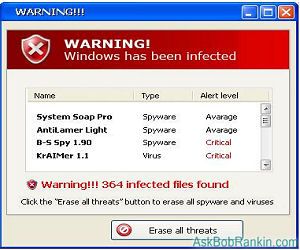It seems that nearly everyone has had the misfortune of dealing with a computer virus by now. If your computer has ever been infected with a computer virus, you know firsthand just how inconvenient and potentially damaging it can be. And then there is the expense of having to have and pay for professional virus removal. There are thousands of computer viruses floating around the Internet with cyber-criminals developing more every day. Fortunately, there are many things you can do to protect yourself. As with many other aspects of life, having the proper habits in place is the best way to ensure success.
Avoid these five mistakes and you’ll be on the right track:
1. Failing to install and use an up-to-date anti-virus program.
It’s true that these programs consume a considerable amount of system resources. However, the consequences of a computer virus are well worth the slight hassle of losing a few CPU cycles. Being ‘smart’ isn’t an acceptable substitute for having a high quality anti-virus program in place. Not for most people at least.
• Ensure that any anti-virus program you’re using is updated on a regular basis. Ensure that it has “real time” protection. Malware and Viruses are constantly being developed and updated. It’s important that your defense is constantly being improved and updated, too.
2. Assuming that an anti-virus program is foolproof.
Most computer users simply have too much faith in the programs that provide protection from malware. Consider the fact that in many cases, computers have to been infected with new viruses before anti-virus program manufacturers can develop solutions to prevent them. Therefore, you might not have the protection you “think” you do. A high quality anti-virus program isn’t an acceptable substitute for researching ways to avoid viruses and constantly developing new web browsing skills and habits.
3. Downloading free software, movies, music, etc.
There are financial advantages to obtaining software, movies, music and games for free, but there are also significant risks. Those that are interested in spreading a computer virus use pirated software as a tool to deliver these malicious programs. You’re not just getting a free movie; you’re also providing the perfect opportunity for a virus to infect your computer. Proceed with caution when anything is free on the internet.
4. Blindly opening email attachments. While most email programs effectively screen email attachments for viruses, it’s generally a good idea to ignore email attachments from unknown senders. This is especially true when dealing with executable files. Consider the source and control your curiosity.
5.Clicking on any popup that states your computer has a virus.

Those annoying popups are a common source of computer viruses. The best solution is to close your browser without clicking on that pesky popup. You can press ALT F4 to close a window without clicking on a pop-up. This common type of infection claims to be the solution to the very problem it’s creating. In most cases, the offered solution will cost you a considerable amount of your hard-earned money.
Few things can disrupt your peace of mind as effectively, or as quickly, as having to stop your busy schedule and call a computer repair professional and schedule a virus removal. Staying safe online requires more than the use of an anti-virus program. The user is always the one variable that can never be completely secured. It’s difficult to protect you from yourself. Diligence and research are important. Spend some time noodling around on the internet for articles on how improve your web browsing skills and habits and reading about how to avoid computer viruses. And, I hope avoiding the five habits above is an good start.
